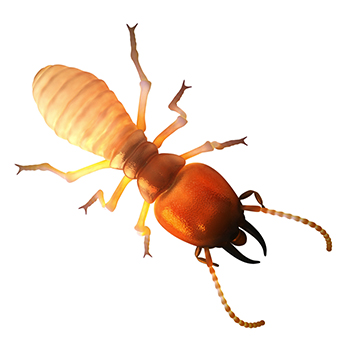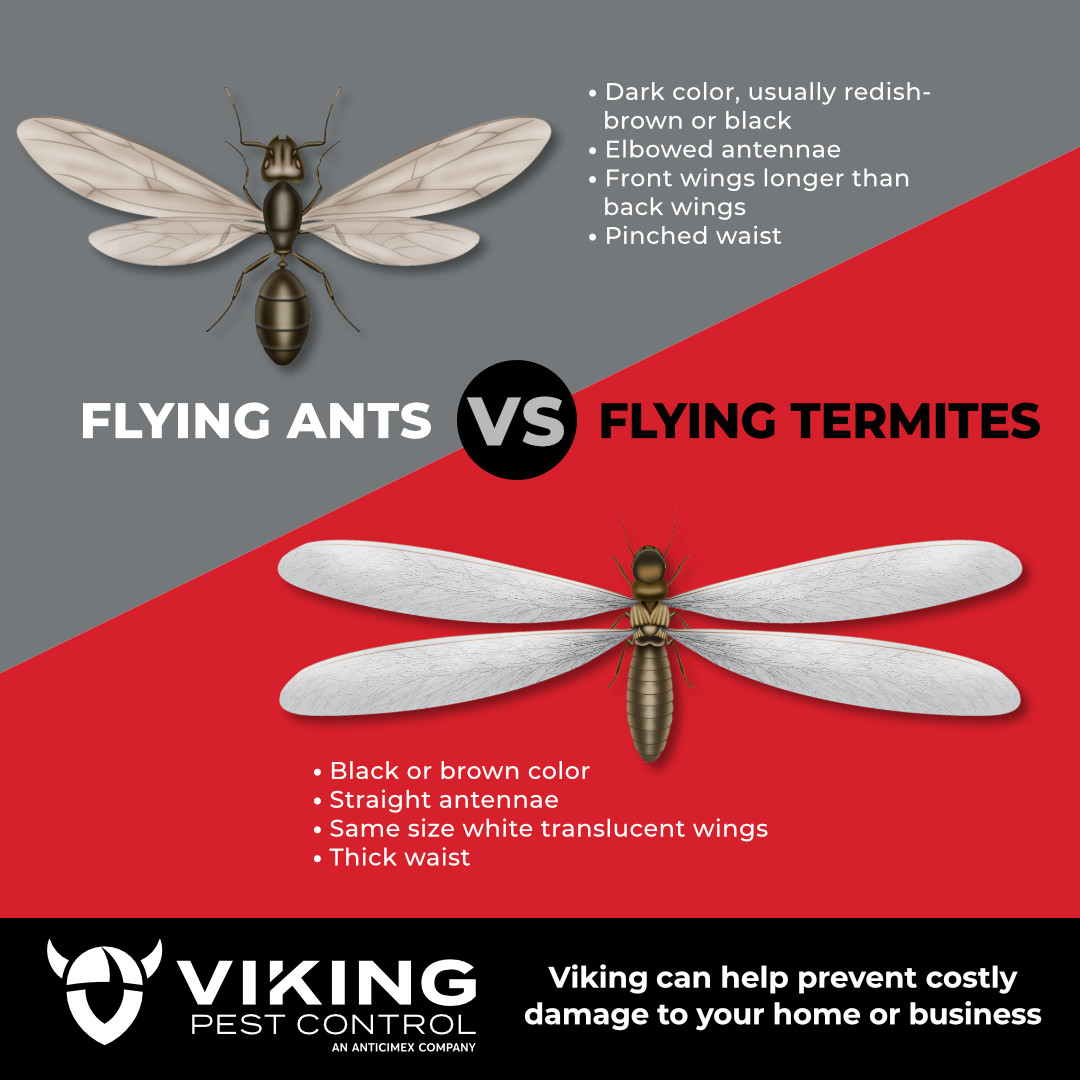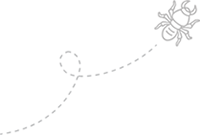Termite Treatment

Termites can cause severe damage to both the aesthetics and structure of your home or business because their main source of food is wood. Termites can cause structural damage by penetrating plaster and metal siding, subterranean damage that is most often mistaken for water damage, and dry wood damage that can go undetected until the infestation grows out of control. And while termites don’t typically present a significant risk of disease, they can spread like an infection through your NJ, PA, MD, or DE home or business. The costs associated with getting rid of termites and repairing the damage can greatly increase the longer these pests are allowed to develop their incognito pathways and colonies. To protect your NJ, PA, MD, or DE home or business from termites, you need to learn about the behavior of this pest, take steps for prevention, and find effective termite treatment options should an infestation occur.
What are Termites?
 Termites reside in large groups—or colonies. They eat all day and night and never take breaks. There are many species of termites in the New Jersey, Pennsylvania, Maryland, and Delaware area, but termites all tend to follow the same eating and movement patterns.
Termites reside in large groups—or colonies. They eat all day and night and never take breaks. There are many species of termites in the New Jersey, Pennsylvania, Maryland, and Delaware area, but termites all tend to follow the same eating and movement patterns.
The king and queen termites are the largest termites in the colony and they are in charge of reproduction. Soldier termites provide protection from threats to the colony. The worker termites are the ones that do the damage to your home or business by eating away at the structural wood, explain the local termite exterminators at Viking Pest. Winged termites, also known as reproductives, alates, or swarmers, eventually leave in search of a new place to establish a colony. Upon finding a location that provides the moisture and food supply they need, the reproductive termites shed their wings and become the king and queen of a new colony, explain the NJ, PA, MD, or DE termite control experts at Viking Pest.
“Termite queens are among the longest-lived insects in the world,” says Craig S., Public Health Entomologist and Viking Pest Service Director “They can live anywhere from 25 to 50 years.”
Among the different types of termites are dampwood and drywood termites. Termite control experts at Viking Pest explain dampwoods are among the largest termites you will find, and they like to feed on damp or moist wood. Dampwood termites don’t have a group classified as “workers,” all of them operate in conjunction as equals. Because termites like moist areas, you will most likely find them in bathrooms or basements.
Termite treatment experts at Viking Pest explain drywood termites are similar to dampwood termites in that they also don’t have workers, however, they do have “false workers” or young termites that do some of the same things workers would typically do. These tasks include feeding the colony and taking care of eggs. Drywood termites are, in many ways, more dangerous than dampwood termites. These termites prefer drier wood, which means they can chomp on virtually any area of your NJ, PA, MD, or DE home or business. This includes wood, of course, but they also like to eat wallpaper and even fabric and plastics derived from plant-based material. They can eat through walls, beams, framing, and any wood- or plant-based component of your home or business explain the termite control experts at Viking Pest.

How Do I Identify Termites?
Viking Pest’s certified entomologist, Craig, explains termites are insects, not arachnids, so they have 6 legs and their bodies are divided into segments. Termites may also have wings, which are all around the same length. Even though termites are sometimes confused with ants, they have some significant differentiating features. Pest control experts at Viking Pest explain that an ant’s front wings are longer than its back wings, whereas termite’s wings are equal in length. Termites also have different antennae than ants. For termites, their antennae come straight out of their heads. By comparison, the antennae of ants, such as wood ants, are bent at a 90-degree angle.
How Do I Get Termites?
Termites commonly get into your New Jersey, Pennsylvania, Maryland, or Delaware home or business through wood-to-ground contact. Any wood component of your house, once in contact with the ground can be a point of access for termites. Termite control experts at Viking Pest state this includes:
- The frames of doors
- Housing supports
- Deck posts
- Steps
- Wood siding that contacts the ground
However, termites don’t always need to enter your house through wood that contacts the ground. Termite exterminators at Viking Pest explain termites that live underground, or subterranean termites can come in your NJ, PA, MD, or DE home or business by using cracks in the framing. Termites can also access your house through cracks in bricks or the mortar joining them. Concrete blocks and the walls of framing may also provide sufficient points of entry, explain the termite treatment experts at Viking Pest.
Drywood termites tend to enter your NJ, PA, MD, or DE home or business when one of these critters finds a crack in the wood components of your structure. They then dig a space for a nest and form a seal that keeps them inside the space. At this point, termites begin laying eggs to start a colony. Over two or three years, the colony can get big enough to cause serious and costly damage, explain the termite control experts at Viking Pest.

What Are the Effects of Termites in and Around My Home or Business?
Pest control experts at Viking Pest state because termites eat wood and plant-based products indiscriminately, termites can take a chunk out of the value of your New Jersey, Pennsylvania, Maryland, or Delaware home or business. It is estimated that in the US, $5 billion of damage is done by this tiny pest every year. The wood of many buildings helps hold it together through a system of framing components. When one of these pieces is weakened all the other beams, posts, and supports that depend on it are affected as well.
Even though termites can sometimes do their damage gradually over several months or a couple of years, the weakening of your property can be permanent and require replacing large sections of the framing. However, if the termite infestation is caught soon enough, the building’s long-term value can be saved.
In addition to the framing of any Pennsylvania, New Jersey, Maryland, or Delaware home or business, termites can also go after doors, window frames, and siding. Termite exterminators at Viking Pest explain not only is the damage unsightly but when termites infest these portholes, they can threaten the energy efficiency and the smooth operation of the doors and windows.
The market value of your home can also drop significantly due to termite damage. Even signs of a former infestation can cause a buyer to move to the next option. Also, termite damage, in some cases, can be enough to slow—or even negate—a sale if it is seen during the inspection process.
Subterranean Termite Mud Tunnels

Eliminate subterranean termites and their mud tunnels from your property with our award-winning termite treatments.
What are Subterranean Mud Tunnels?
Subterranean termites are a nightmare to residential and commercial property owners. Termites build mud tunnels out of soil, wood, and their saliva to connect underground colonies with food sources above-ground. What’s more, these tunnels protect termites from moisture and predators, explain the termite extermination experts at Viking Pest.
What Do Termite Mud Tunnels Look Like?
Termite mud tunnels tend to look like stalagmites in caves. When inspecting your property for termites, look out for three types of mud tunnels— working tubes, exploratory tubes, and drop tubes. Working tubes run from the soil to a food source, while exploratory tubes go through the soil. A drop tube forms a path from the wood back to the soil.
Where to Find Mud Tunnels in Your Home
Termites love moisture. Viking’s termite control experts normally find termite mud tunnels around framing cracks, unprotected brick walls, bathrooms, laundry rooms, crawlspaces, or any other moist areas around your property.
How Do I Prevent Termites?
To prevent termites, it’s easiest to first take steps during the building process to shield your home or business. Termite control experts at Viking Pest explain every 1 year, a termite inspection should be performed to identify if any colonies have developed. If a pest professional from Viking Pest discovers termite activity, the home or business owner will have the option of using a Termite Bait and Monitoring System. This termite treatment is environmentally sensitive and very effective at eliminating termites. After the initial inspection, various Termite Bait and Monitoring System stations are placed throughout the soil surrounding the property. Once termites are detected, Recruit termite bait is placed in Baitube devices and positioned near the termite activity. Once the termites begin eating the bait, their colonies will begin to eradicate. Viking Pest will continue to monitor the stations for any subsequent activity.
If you’re in NJ, PA, MD, or DE home or business is already built, you can remove all wood that lies along the foundation. You should also remove anything else termites like to eat such as cardboard, paper, mulch, or any plant-based product. This way, you are removing the “bridge” from the ground to your house. Termite treatment experts at Viking Pest recommend keeping plants and mulch away from the edges of your home will also help deter an infestation. To remove potential water sources, fix leaky faucets and any leaks in your basement or roof.
The best way to exterminate termites and control them in the future is to use advanced termite treatment. Our pest control experts at Viking Pest recommend using Termite Bait and Monitoring System stations around your NJ, PA, MD, or DE home or business to attract and eliminate termites.














